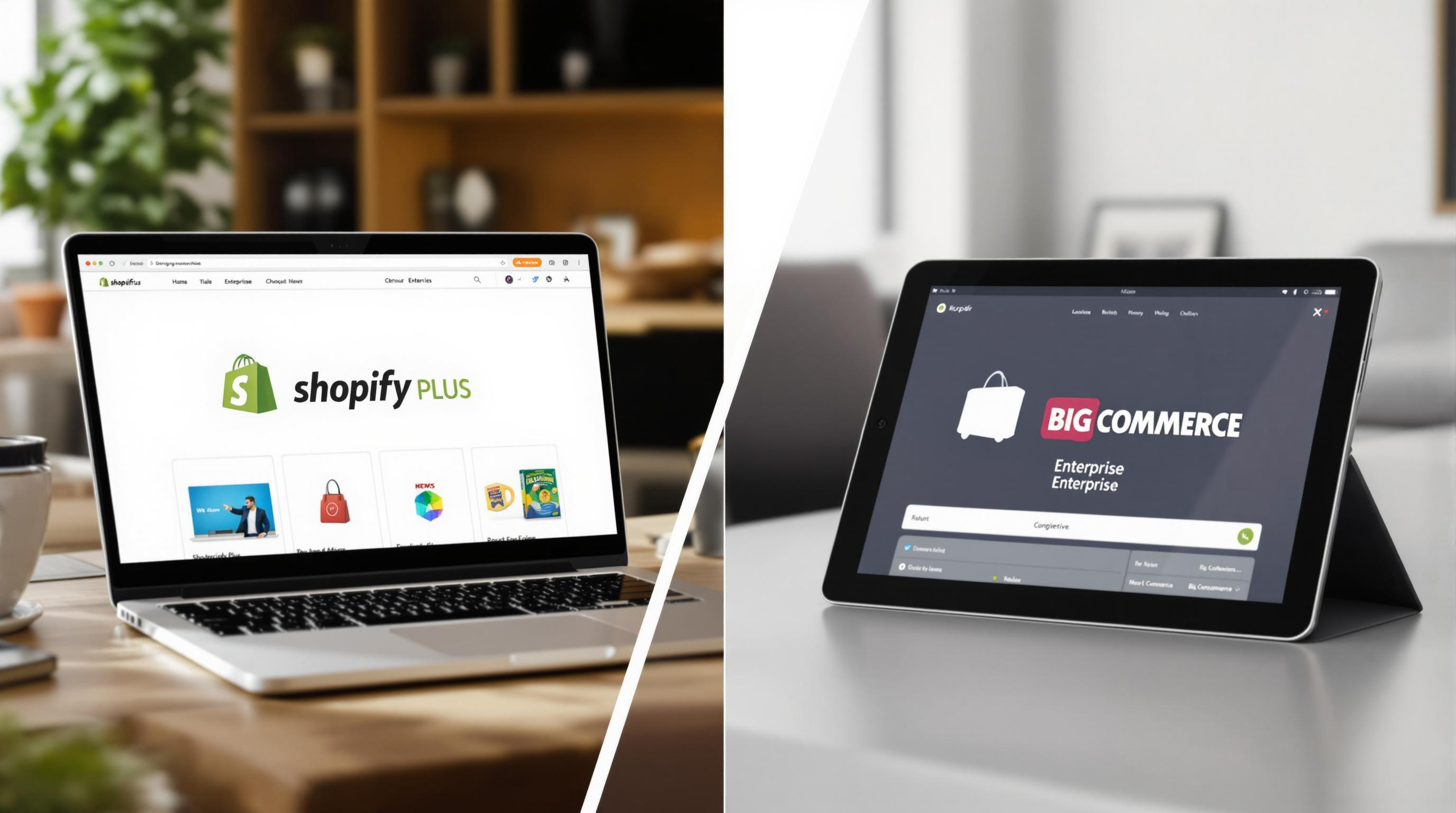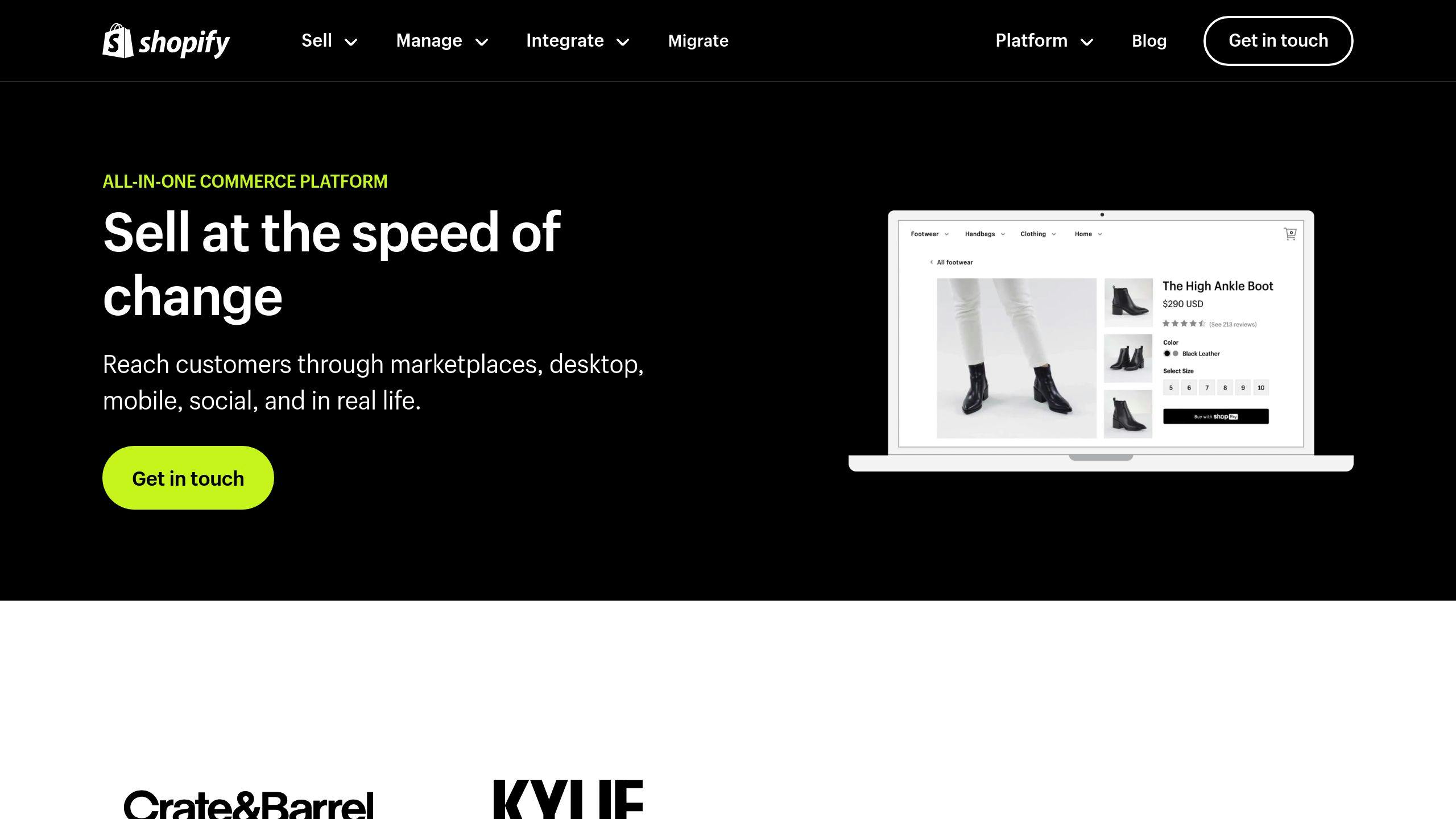By Mladen Terzic
Shopify Architecture & Infrastructure
16th Oct 2025
8 min read
Shopify Plus vs Enterprise eCommerce Platforms Comparison
Comparing Shopify Plus and BigCommerce Enterprise reveals key trade-offs: Shopify Plus offers seamless high-volume checkouts and a vast app ecosystem, while BigCommerce Enterprise provides robust built-in tools, advanced APIs, and multi-brand support. Learn about pricing, customization, and real-world use cases to pick the best platform for your needs.

Choosing between Shopify Plus and BigCommerce Enterprise comes down to your business needs. Shopify Plus is ideal for fast-growing businesses needing simple management and seamless scalability, handling up to 11,000 checkouts per minute. BigCommerce Enterprise excels with built-in tools, advanced APIs, and support for complex catalogs or multi-brand operations.
Key Differences at a Glance:
- Shopify Plus: Great for high-volume retailers, global scalability, and app integrations. Starts at $2,000/month.
- BigCommerce Enterprise: Best for businesses needing advanced customization, built-in features, and multi-store management. Pricing ranges from $400–$20,000/month.
| Feature | Shopify Plus | BigCommerce Enterprise |
|---|---|---|
| Starting Price | $2,000/month | $400–$20,000/month |
| Customization | App-based (4,000+ apps) | Built-in tools, open API |
| Scalability | Handles 11,000 checkouts/min | Multi-brand, complex catalogs |
| Best For | High-volume DTC brands | Multi-brand, B2B operations |
Bottom Line: Shopify Plus is perfect for simplicity and speed, while BigCommerce Enterprise fits businesses with technical needs and intricate setups. Read on for a detailed breakdown of features, costs, and examples.
Main Differences Between Shopify Plus and Other Platforms

Features and Tools
Shopify Plus and its enterprise-level competitors cater to different business needs with their distinct features. Shopify Plus stands out with its strong multi-channel selling capabilities and a fast, reliable checkout process, making it a great choice for high-volume retailers.
On the other hand, platforms like BigCommerce Enterprise focus on built-in marketing tools and native SEO functionalities. For inventory management, Shopify Plus supports multiple inventory locations, while BigCommerce Enterprise offers centralized management with advanced options like buy online, pick up in store (BOPIS).
While these features form the backbone of each platform, the ability to tailor them to specific needs often depends on their customization options.
Customization Options
Customization options vary widely across platforms. Shopify Plus offers access to a marketplace of over 4,000 extensions [1], giving businesses a variety of tools to meet their needs. However, achieving specific functionality often requires combining multiple apps.
BigCommerce Enterprise takes a different route, offering more built-in tools and an open API structure. This reduces the need for third-party apps but demands a higher level of technical expertise. Its API supports up to 400 calls per minute [2], making it a powerful option for businesses with advanced technical requirements.
While customization is important, scalability and performance also play a key role in selecting the right platform for long-term growth.
Scalability and Performance
Both platforms handle scalability well but approach it differently. Shopify Plus boasts an impressive 99.99% uptime [3] and can manage heavy traffic without requiring merchants to step in - ideal for businesses with rapid growth or seasonal surges.
BigCommerce Enterprise shines in areas like multi-brand support and advanced B2B features. It’s particularly strong when managing complex product catalogs and multi-channel operations, including marketplace and POS system integrations.
The choice often comes down to specific business needs. Companies with intricate product catalogs may lean toward BigCommerce Enterprise, while those focused on fast scaling and ease of management often prefer Shopify Plus’s streamlined system.
BigCommerce or Shopify Plus? Choosing the Best Ecommerce Platform for Your Business
sbb-itb-6dc743d
Costs and Pricing Models
When selecting the right eCommerce platform, pricing plays a major role. It directly affects your return on investment and how well the platform can grow with your business.
Subscription Fees and Transaction Costs
Shopify Plus and BigCommerce Enterprise take different approaches to pricing. Shopify Plus starts at $2,000 per month and uses a variable pricing model that adjusts based on your sales volume. It's a good fit for businesses generating between $1 million and $500 million annually.
BigCommerce Enterprise, on the other hand, offers customized pricing. While they don’t publicly list their rates, costs typically fall between $400 and $20,000 per month.
| Platform | Starting Price | Pricing Model |
|---|---|---|
| Shopify Plus | $2,000/month | Variable, based on sales volume |
| BigCommerce Enterprise | $400–$20,000/month | Customized flat rate |
For high-volume businesses with simpler needs, Shopify Plus’s pricing is often a great match. Meanwhile, companies managing multiple brands or more complex operations may lean toward BigCommerce Enterprise’s tailored pricing. Shopify Plus also tends to offer lower credit card processing fees compared to other platforms, though actual rates depend on your payment gateway and sales volume.
Additional Costs to Consider
Subscription fees are just part of the equation. Shopify Plus often relies on third-party apps for added functionality, which can drive up costs. BigCommerce Enterprise, thanks to its robust built-in features, reduces the need for additional integrations, potentially keeping expenses lower. Their Premium Account Services team also provides hands-on support for technical and operational needs.
Here are some key extra costs to keep in mind:
- Development fees for customizations
- Third-party integration costs
- App subscriptions, especially relevant for Shopify Plus
- Technical support and maintenance
- Training and onboarding expenses
Companies like YETI and Badgley Mischka have made the most of BigCommerce Enterprise’s built-in tools. Meanwhile, brands like Shiseido and SONY have used Shopify Plus effectively by carefully selecting the integrations they need [2].
Knowing these costs and how they align with your business model is essential. Looking at how other companies have succeeded with these platforms can also help guide your decision.
Examples of Businesses Using Shopify Plus and Other Platforms
Looking at real-world examples can shed light on how businesses use eCommerce platforms to tackle challenges and reach their goals.
Businesses Succeeding with Shopify Plus
Shiseido uses Shopify Plus to expand globally while running smooth multi-channel operations. The platform proves especially helpful during busy sales events and promotions, showing its ability to support growing brands on a global scale.
SONY and Converse rely on Shopify Plus to manage extensive product catalogs and boost direct-to-consumer sales. Features like streamlined inventory management and Shop Pay contribute to higher conversion rates, making it clear how the platform can handle a variety of retail needs.
How Other Platforms Solve Business Challenges
BigCommerce Enterprise stands out for addressing complex business needs. For example, YETI uses its advanced API tools to manage a detailed product catalog and multiple storefronts, demonstrating its strength in handling multi-brand operations [2].
Badgley Mischka taps into BigCommerce Enterprise’s built-in tools for luxury retail, benefiting from AI-driven personalization and analytics to craft tailored shopping experiences for their high-end customers.
Saddleback Leather takes advantage of BigCommerce Enterprise’s flexible backend to design a unique shopping experience while keeping operations efficient. This showcases how the platform supports businesses with specific customization requirements.
| Brand | Platform | Key Benefits |
|---|---|---|
| Shiseido | Shopify Plus | Global reach, Smooth peak performance |
| YETI | BigCommerce Enterprise | Multi-brand management, Advanced APIs |
| Badgley Mischka | BigCommerce Enterprise | AI personalization, Luxury retail |
These examples highlight how Shopify Plus and BigCommerce Enterprise address different business needs, offering insights for companies choosing their next eCommerce platform.
Conclusion and Advice for Choosing the Right Platform
Choosing the Best Platform for Your Business
When deciding between Shopify Plus and other enterprise platforms, it's crucial to assess your business's specific needs and growth plans. Shopify Plus stands out for its extensive app options and automation tools, handling nearly 11,000 checkouts per minute. This makes it a strong choice for businesses that need smooth, fast transactions during busy sales events.
On the other hand, companies with more intricate product catalogs or requiring advanced built-in functionality might find BigCommerce Enterprise more suitable. It supports up to 400 API calls per minute compared to Shopify Plus's 10, offering better support for complex integrations.
| Business Need | Recommended Platform | Key Advantage |
|---|---|---|
| Fast Checkout & High Volume | Shopify Plus | Handles 11,000 checkouts/minute |
| Complex Product Catalogs | BigCommerce Enterprise | Advanced built-in features |
| Multi-brand Management | BigCommerce Enterprise | Centralized multi-store management |
| App Integration Focus | Shopify Plus | Wide-ranging app ecosystem |
These factors can help you determine which platform aligns best with your business priorities.
Final Summary
Pricing is another key consideration. Shopify Plus starts at $2,000 per month, while BigCommerce Enterprise offers customized pricing. Be sure to include additional expenses like apps, customizations, and support when comparing costs.
Shopify Plus provides a Merchant Success Manager, while BigCommerce Enterprise offers Premium Account Services for personalized assistance. In terms of user satisfaction, Shopify Plus scores 4.8/5, while BigCommerce Enterprise earns 4.4/5, reflecting their respective strengths in user experience and flexibility.
This guide gives business leaders the information they need to choose a platform that matches their operational and growth goals. Focus on scalability, customization, and long-term needs to make the best decision. Both platforms deliver enterprise-level solutions, but their strengths cater to different types of businesses and operational demands.


